
Nanchez Peat Bog trail
8 points of interest
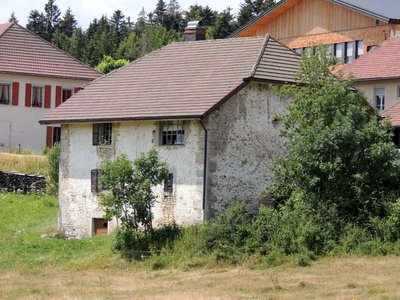
PNRHJ - F. Jeanparis History & HeritageThe evolution of life and buildings
The rural house was first the one belonging to the farmer and livestock breed, where men and animals lived together. As from the 18th century, cheese specialisation and the pooling of milk in cooperative structures - “fruitières” - brought farmers out of a self-subsistence economy. In terms of buildings, the farm became bigger: a storey is added to include bedrooms, a second stable is sometimes built to accommodate more animals.
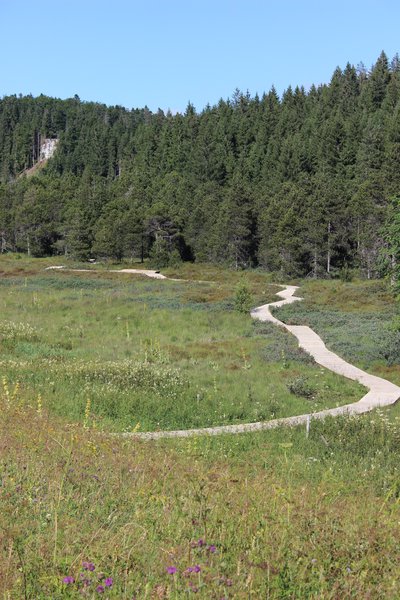
Tourbière de Nanchez - Julien Vandelle Natural environmentsThe Nanchez peat bog
Peat bogs are characterised by a surface that is constantly water-logged, where peat forms and accumulates: it is a type of bedding made-up of dead vegetation which has badly decomposed due to the absence of oxygen. Life conditions are demanding in these environments and this means that the species that live here must adapt to the omnipresence of water, to a relatively cold climate and to the chemical composition of the soil.
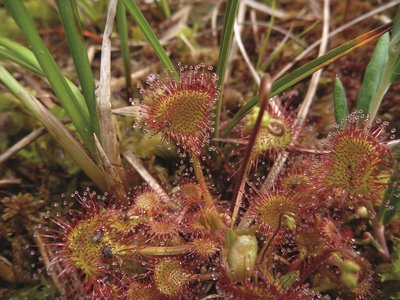
Droséra - PNRHJ / Pierre Durlet FloraSundew
This small carnivorous plant traps insects using its sticky digestive-juice covered hair. This adjustment allows the plant to acquire additional nutrients in this environment where its roots struggle to find enough food.
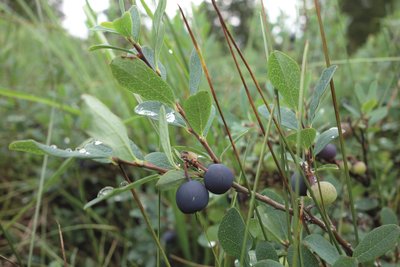
Airelle des marais - PNRHJ / Carole Zakin FloraThe bog bilberry
This phony blueberry favours environments that are slightly acidic, which is why it can be found in raised bogs or bogs that are in the process of drying out. Its edible berries, which mature mid-summer, are not as sweet as blueberries.
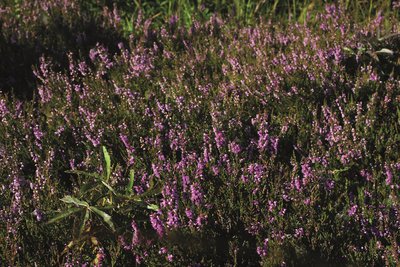
Callune - Julien Guyonneau FloraCalluna
This plant’s roots produce toxic secretions which hinder the growth of other species. It is often called common heather.
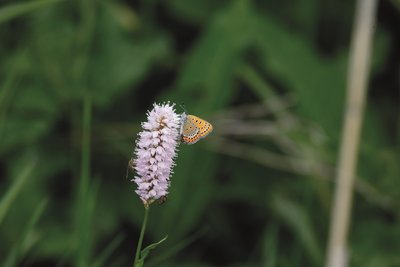
Cuivré de la bistorte - Pierre-Marie Aubertel FaunaThe violet copper
This butterfly is typical of northern regions. Adults can be seen flying around in May and at the beginning of June. Females lay their eggs by sliding backwards under the leaves of the common bistort. Caterpillars then complete their development on the underside of these leaves.
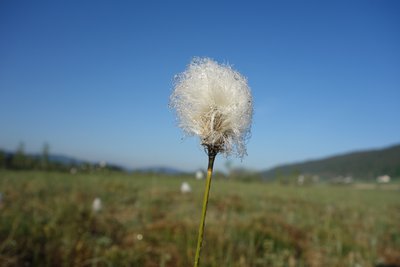
Linaigrette - PNRHJ / Carole Zakin FloraCottongrass
Their silky tuft does not appear during the flowering stage but rather the fruit stage: the cotton-like fibres that make-up this tuft are carried by the wind to aid the dispersal of its seeds.
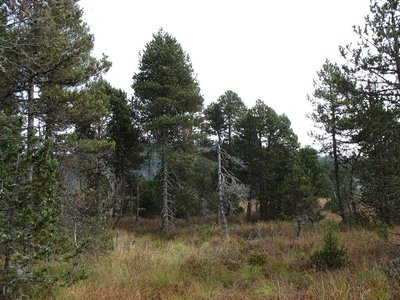
Pins - PNRHJ / Marie Voccia FloraMountain pine
In the Jura, these trees are found almost exclusively in peat bogs: its bushy silhouette, its short needles that grow in pairs of two and the hook on the leaves of its cones are some of its distinctive features that will help you to identify one.
Description
To the front of the PRENOVEL church, the route heads off to the right (yellow waymarking) via the D 232, then quickly (70 m), take the road descending to your right, bordered by a few houses, until you reach La Vigne. Continue on a good white path until you reach Le pont des Janiers bridge. The path crosses the Nanchez to your right and ascends towards the Cotat Bossu.
Following this grassy ridge, the path leads to THE PEAT BOG. Embark to your right along the winding boardwalk, immerse yourself in the atmosphere and unearth some of the Nanchez peat bog's secrets by reading the markers found along the trail.
At La Croisée des Biefs, continue in the same direction, cross a new walkway near where the Nanchez meets the Trémontagne creek and come to a road at Le Pontet.
Follow the road to the right for 150m and ascend to your left to the Belvedere which overlooks the combe.
Go back to Pontet and la Croisée des Biefs the same way.
Take the path to your right and cross the Nanchez again. From the Walkway, follow the path to the left and reach the pont des Janiers bridge then, going back the same way you came, return to PRENOVEL.
- Departure : Prénovel village square
- Arrival : Prénovel village square
- Towns crossed : Nanchez and Grande-Riviere Chateau
Forecast
Sensitive areas
- Impacted practices:
- Aquatic,
- Sensitivity periods:
- JanFebMarAprMayJunJulAugSepOctNovDec
- Contact:
- Parc naturel régional du Haut-Jura
29 Le Village
39310 Lajoux
03 84 34 12 30
www.parc-haut-jura.fr/
- Impacted practices:
- Aerial, Aquatic, Amenities, , Underground, Land-based
- Sensitivity periods:
- JanFebMarAprMayJunJulAugSepOctNovDec
- Contact:
- Conservateur : Laurane Palanchonl.palanchon@parc-haut-jura.fr Parc Naturel Régional du Haut-Jura29 le village39310 LAJOUX03 84 34 12 30
Recommandations
This trail passes through pastures with livestock. To respect the owners and farmers granting you passage, and for the security of livestock and wild fauna, we ask that you remain on the waymarked paths. Use the adapted passageways to get across fencing and be sure to close gateways behind you.
Please keep your dog on a lead if you have one.
Wild flowers are beautiful in the peat bog and in the surrounding fields, they may be rare and protected and often wilt quickly. Do not pick them! They will delight the next hikers.
In case of forest works (felling, skidding, etc.), for your safety, know when to stop and turn around.
In the adapted area of the peat bog (boardwalk), between THE PEAT BOG and Le Pontet, for the safety of all and to respect this unique environment, there are a few additional rules:
- Do not leave the boardwalk
- Cycling is not authorised
Information desks
Tourist information centre - Haut-Jura Grandvaux
7 place Simone Veil, 39150 Saint-Laurent-en-Grandvaux
Transport
Access and parking
Parking :
Report a problem or an error
If you have found an error on this page or if you have noticed any problems during your hike, please report them to us here:
